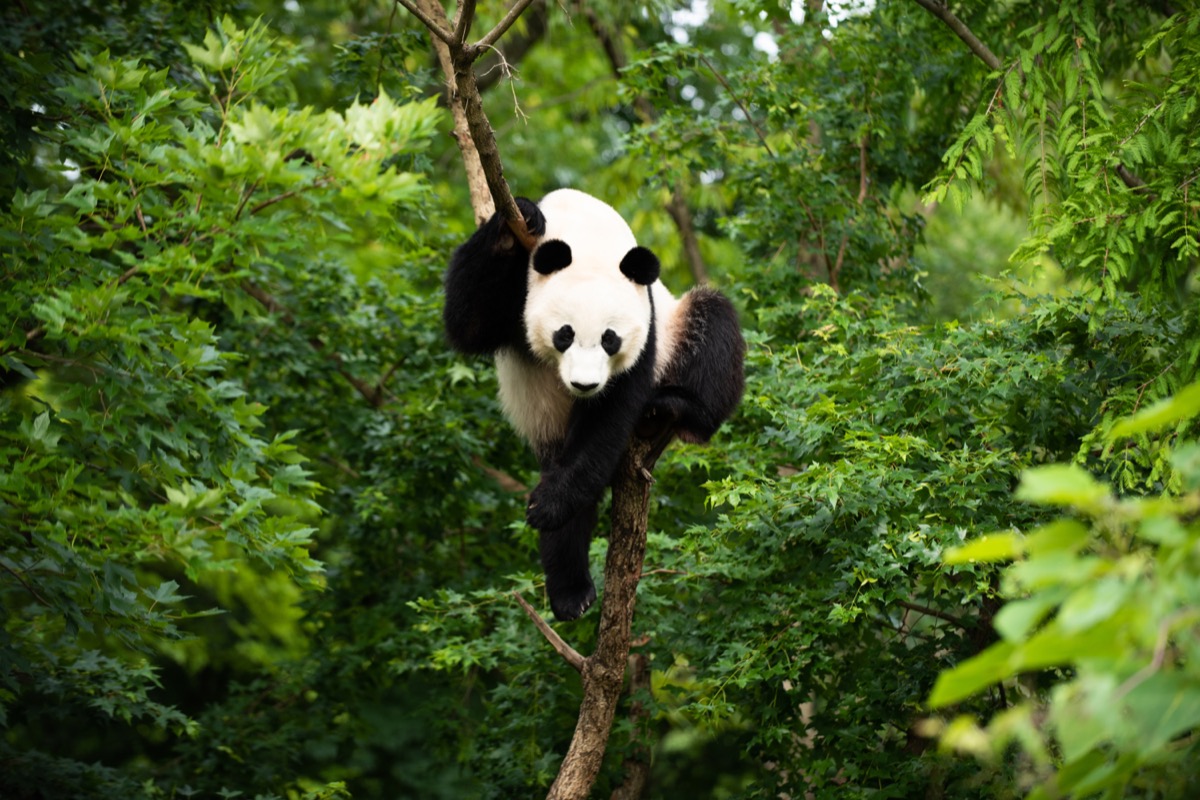Now Is Your Last Chance to See Pandas at U.S. Zoos—Here's Why
Your opportunities are dwindling for a panda encounter in this country.

With their cuddly features, bold colors, and the way they sit upright like humans, pandas are fascinating animals. Chances are you've watched them nibbling on bamboo at one of several zoos around the country. Over the past few decades, they've been on display at the San Diego Zoo, Zoo Atlanta, the Memphis Zoo, and the Smithsonian National Zoo. But you might not realize that the pandas you visit don't belong to the zoos themselves—they're on loan from China.
Unfortunately for panda lovers everywhere, those loans end this year. Once the giant pandas return to their homeland, it will be the first time the U.S. will be without them since 1972, according to The Washington Post. Read on to learn more about pandas' history in the U.S., and why they're making their way back to China.
RELATED: The 12 Best Zoos in the U.S. to Add to Your Bucket List.
Pandas have caused a stir in the U.S. for nearly a century.

According to the World Wildlife Fund (WWF), pandas are native to the mountains of Southwest China, where they're considered a national treasure. The first one to leave the country arrived in California in Dec. 1936—a three-month-old cub named Su Lin, who would go on to reside at Brookfield Zoo in Chicago.
Unsurprisingly, the pint-sized bear was a hit. Within six months of his arrival, more than 300,000 people came to visit. "Everyone from Helen Keller to Al Capone couldn't resist the chance to visit a panda," writes the Smithsonian.
In 1941, China gifted two pandas to the Bronx Zoo the day before the U.S. entered World War II. It was a gift of thanks and the last of its kind for a while. By the early 1950s, the U.S. had no pandas left.
RELATED: U.S. Just Declared 21 Species of Animals Extinct: "It's a Wake-Up Call."
"Panda diplomacy" began in 1972.

After seeing how well-received its pandas were by allies, China began distributing more as gifts; several went to North Korea and the Soviet Union during the Cold War. After Richard Nixon visited China in 1972, China gifted two pandas to the National Zoo.
"It was reflecting a shift in the relation from enemy state to one of friendship," E. Elena Songster, a historian at Saint Mary's College of California and author of the book Panda Nation, told CNN.
In 1984, China decided to stop gifting its pandas for free. It switched to offering them up via high-priced "research" loans. According to CNN, those typically last 10 years and cost $1 million annually; about 20 countries participate.
Just because the loans cost money doesn't make them any less meaningful from a foreign relations standpoint. China has acknowledged its use of pandas in politics. In a 2013 op-ed for The Washington Post, China's ambassador to the U.S., Cui Tiankai, wrote, "There are actually two Chinese ambassadors in Washington: me and the panda cub at the National Zoo."
The panda loan is about to end.

Most years, when the U.S. panda loan ends, representatives will negotiate a new one with the China Wildlife Conservation Association. This year, however, those attempts have failed, reports USA Today. The National Zoo in Washington, D.C., will return its pandas, Tian Tian, Mei Xiang, and Xiao QI Ji, to China by Dec. 7. Tian Tian and Mei Xiang have been at the zoo since 2000.
The four pandas at Zoo Atlanta will also bid farewell. Two of the pandas, Ya Lun and Xi Lunare, are set to return in early 2024; the other two, Lun Lun and Yang Yang, will likely stay until late 2024 when their contract ends.
The Memphis Zoo in Tennessee returned its panda in April, and the San Diego Zoo returned its pandas in 2019, according to CBS News.
RELATED: Monkeys Stolen From Dallas Zoo in Latest Bizarre Incident.
The failed negotiations could reflect tension between the U.S. and China.

Dennis Wilder, a senior fellow at Georgetown University's Initiative for U.S.-China Dialogue on Global Issues, told ABC News that the end of the panda program could be intended as a punitive measure. "[Beijing is convinced that] NATO and the United States are lining up against China," he said.
While there's a chance the two countries will resolve their issues—and come to a last-minute agreement on pandas—it might be worthwhile to visit the bears now, before their scheduled departures.
RELATED: For more up-to-date information, sign up for our daily newsletter.





















